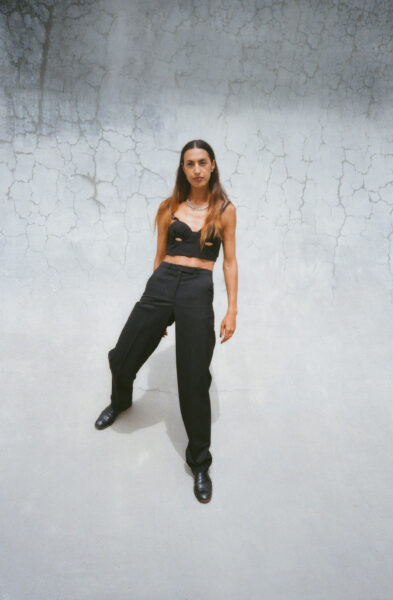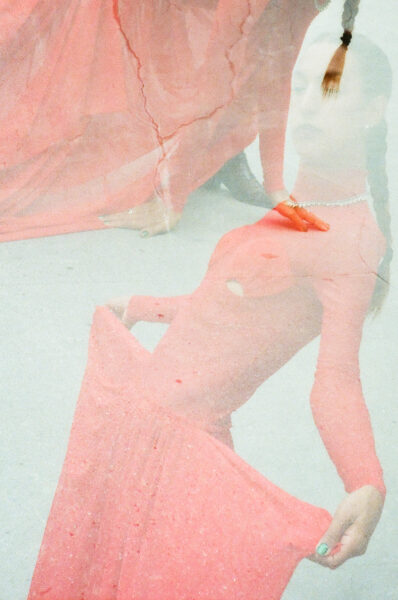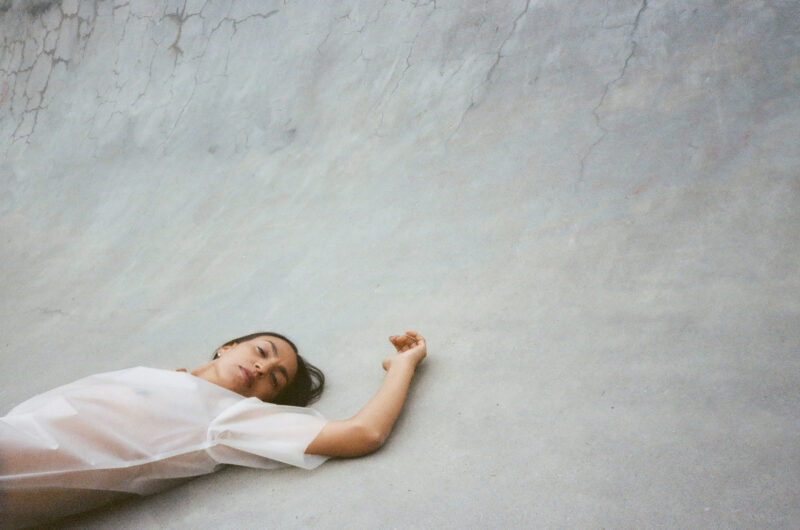Veronica D’Souza’s musical expression is deeply shaped by her background as an activist, entrepreneur, and advocate for women’s rights. Drawing from her Indian, East African, and Danish heritage, Veronica’s genre-defying artistry is a statement of her lived experience as an agent for change. Her previous venture, founding the sustainable fashion label CARCEL, made global headlines for its empowerment of women in prisons through paid employment and education. When the pandemic forced its closure, Veronica channelled her spirit into music, teaching herself production and emerging as an impactful independent artist. Now, her music serves as an extension of her activism, weaving complex narratives within a tapestry of alt-pop traditions.
“Peaches In My Halo” is fuelled by syncopated rhythms, chant-like melodies, and lush harmony, as Veronica D’Souza exalts the importance of transformation and breaking free from societal expectations. As the song unfolds, its chorus metamorphoses from a hook into an empowering affirmation, with Veronica’s striking vocal tone preaching the mantras to her choir. In this conversation, the singer opens up about her new releases, her way back into music, and how it all connects to her activism.

Photo by Ida Hermansen
Sasha Renn: Veronica, you mentioned that you take inspiration from women before you, unapologetically expressing their true selves as they move through the world. What inspires you about the previous generation of women inspires you?
Veronica D’Souza: I’ve always been drawn to elderly women who speak without apology, who carry themselves with the weight and wisdom of years, unbothered by the world’s expectations. But reaching that level of freedom is often a messy journey, filled with both internal struggles and external obstacles. “Peaches in My Halo” is a rebellious song about breaking free from conformity and defying the roles we’re often pushed into. We all carry many sides to ourselves, yet only certain parts are celebrated so most of us morph to be more of what is liked. It takes tremendous courage to carve out space for hidden dreams and different versions of ourselves that might not be met with initial applause. The song reflects that—it’s about embracing those other sides, including alternative ways of living in the world.
How do you see this message of breaking free from conformity reflected in your own life experience?
I’ve never followed a traditional path. My fashion journey was driven by a desire to create better opportunities for marginalized women, particularly those incarcerated for non-violent, poverty-related crimes in places like Peru and Thailand. I saw fashion as a way to offer proper wages and education to create better opportunities within and after prison, highlighting their craftsmanship while building a brand rooted in change. That experience, working with resilient and talented women, gave me the confidence to teach myself to produce on my own.
It’s about burning down those walls, embracing all the contradictions, and living boldly in the spaces in between. The song calls for that—the freedom to be unashamedly, unapologetically complex, and proud of it.
“The Road is About to Shake”
Throughout “Peaches In My Halo” your lyrics are grounded in this freedom fighter spirit, as you paint with colourful metaphors and vivid imagery. The song journeys from disillusionment to liberation – especially that of women and marginalised groups. Veronica, why is the topic important to you and how did you work it into the song?

Photo by Ida Hermansen
There’s this constant pressure on women to behave and present themselves in a certain way. If we deviate from those expectations, society tells us something is wrong with us. The idea of femininity, of relationships, and how we’re supposed to live and behave can be stifling. The song isn’t just about the image of women. It’s an invitation to challenge the narratives we’ve been fed and have internalized—like what relationships or success look like. There are so many limiting boxes society places us in. As a result, we start censoring ourselves before we even try to express who we truly are.
How has music helped you to get to the point of expressing who you truly are?
When I first began making music, I was scared – scared I wouldn’t be taken seriously as an artist coming from a different field. To confront my fears, I wrote them all down and looked at them through the eyes of my future self, imagining what an older, wiser version of me would think. It became clear how absurd it was to hold myself back from doing something I loved just because of what others might think. Ultimately, it doesn’t matter whether you’re “good” at something by society’s standards. What truly matters is whether you find joy in what you do.
That’s how we should judge ourselves and each other—not by accomplishments or skill, but by the happiness we derive from the things we pursue. I look for role models who unapologetically practice giving space to all of their ‘peaches’ with integrity, ambition and joy.
Your music feels like a comforting blanket with “Just Because A Crush” soothing those with anxiety and fragile mental health, and the latest single a vibrant mantra for morning routines. What message would you like your listeners to take away from “Peaches In My Halo” specifically?
The message of peaches in my halo is that life is too short to be anyone else. It’s concerned with asking these central questions: What parts of you are you not living and why? What would it take for you to give life to all that you are? It’s about rising from the ordinary, igniting the parts of yourself that are rebellious, that are messy, and to live them all.
Moments of Shared Resonance
Veronica, your entry into music began during the lockdowns. What was the first spark of inspiration to dive into music production during the lockdowns and use it as a vehicle for your activism?
Before lockdown, I was CEO of my company, fully committed to using fashion as a tool for change, amplifying the message as loudly as I could. The pandemic halted everything, and with the company closing down, I was forced to sit still for the first time in years. That’s when I returned to music. Sitting at the piano again felt like coming home. It became a way to explore, travel, and express myself without ever leaving the room. Music brought me a new kind of joy I hadn’t felt in a long time, and I realized I needed to let myself explore this more introverted way of creating resonance.
My work has always been about creating space where people feel they belong, and my music naturally reflects that. I don’t believe a single song can change the world. But I do believe that art, culture, and music can create emotional connections, and those connections are what we need to come together and imagine better systems. More than ever, we need those moments of shared resonance to remind us that our lived experiences are connected and uniting us as a collective.
What does being an activist mean to you?
I see activism as a way of life, a practice, which carries a certain responsibility. Sometimes that looks like radical, large-scale actions, other times it’s about creating space for smaller, quieter revolutions or just wonderings. As a musical practice, I would like to stay humble and just celebrate the space of being and making. Being in a creative process without any specific purpose is a form of personal rebellion that I find extremely liberating. Yet, I can’t shy away from the fact that my values run through everything I do – trying to minimize the gap between myself and what I stand for as a human being and a human doing.


Quiet Fights for Social Change
With this political expression sewn into the fabric of your creativity, does this affect the sonic landscapes of your songs? “Peaches In My Halo” has a buoyant, indie-pop atmosphere while your previous track “Just A Crush” has a more haunting, dark air.
I try not to overthink anything in my creative process but just be and listen to what comes out. I try to create first and then maybe rationalize afterward, and I’m quite often surprised. It is a very different approach than when I strategize for social change. Intuition first. I am not on any creative crusade to convince anyone of anything, but more curious and investigating themes and questions that matter to me. Some of those themes relate to fighting the patriarchal monoculture that has dominated society for thousands of years and making space for a more inclusive world. Some of them are more related to personal freedom of expression, celebrating an uproar with societal expectations in general. Most often in life, we are asked to have a point with what we do.
In my music practice, I try to just give space to whatever comes, zone in and lose time. Maybe that is a quiet fight for social change in itself.
The next song I am sending out is called “A Mountain”. It’s about wanting more for young girls than fitting into the set of values that dominate today. I had a lot of fun writing it. I wanted it to be playful and fierce. I imagined a world where young girls no longer have to fight for their seat at the table, but are already there, not caring about the tables, just doing their own thing.
The soundscape reflects that by mixing genres from alt-pop to hip-hop. I shot a music video with a group of young girls driving around in a car, just having a blast, being who they are, without the glaze of anyone else. Their friendship, community, independence and power transcends. Making that made me happy. The whole process was a celebration of what they represent, and I can’t wait to share it.
These singles have given us a glimpse into your upcoming debut album. Can you tell us more about the themes on the record and how these tracks fit into the bigger picture?
All the tracks are bits and pieces of me and something I care about, big or small. I try not to think about any bigger picture, but work on every song as a fresh and new opportunity to create freely. But I guess, glancing over it as a whole there are common themes of freedom and expression, as well as playfulness and defying norms and boundaries. One of my favourite books is “Seven Gothic Tales” by Karen Blixen, released under her male pseudonym Isak Dinesen. Her work really is about all the different identities we all have at the same time.
On this album, I am giving space to as many of my voices as possible with no regard for whether that ‘fits’ into a bigger picture. Maybe that’s what life is, little snapshots of moments of expression. What the grander scheme might mean in the end, might not be the meaning at all. I leave that open for interpretation.
Veronica D’Souza‘s “Peaches in My Halo” is out now. Stay up to date with the artist via Instagram or her website.



